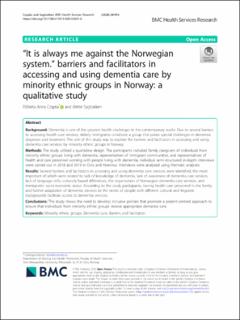| dc.contributor.author | Czapka, Elzbieta | |
| dc.contributor.author | Sagbakken, Mette | |
| dc.coverage.spatial | Norway | en_US |
| dc.date.accessioned | 2021-06-21T13:35:56Z | |
| dc.date.available | 2021-06-21T13:35:56Z | |
| dc.date.created | 2020-10-09T10:10:33Z | |
| dc.date.issued | 2020-10-15 | |
| dc.identifier.citation | BMC Health Services Research. 2020, 20, (1-15). | en_US |
| dc.identifier.issn | 1472-6963 | |
| dc.identifier.uri | https://hdl.handle.net/11250/2760463 | |
| dc.description.abstract | Background: Dementia is one of the greatest health challenges in the contemporary world. Due to several barriers to accessing health care services, elderly immigrants constitute a group that poses special challenges in dementia diagnosis and treatment. The aim of this study was to explore the barriers and facilitators in accessing and using dementia care services by minority ethnic groups in Norway.
Methods: The study utilised a qualitative design. The participants included family caregivers of individuals from minority ethnic groups living with dementia, representatives of immigrant communities, and representatives of health and care personnel working with people living with dementia. Individual semi-structured in-depth interviews were carried out in 2018 and 2019 in Oslo and Akershus. Interviews were analysed using thematic analyses.
Results: Several barriers and facilitators in accessing and using dementia care services were identified, the most important of which were related to lack of knowledge of dementia, lack of awareness of dementia care services, lack of language skills, culturally based differences, the organisation of Norwegian dementia care services, and immigrants’ socio-economic status. According to the study participants, having health care personnel in the family and further adaptation of dementia services to the needs of people with different cultural and linguistic backgrounds facilitate access to dementia services.
Conclusions: The study shows the need to develop inclusive policies that promote a patient-centred approach to ensure that individuals from minority ethnic groups receive appropriate dementia care. | en_US |
| dc.description.sponsorship | The study was funded by Stiftelsen Dam (Extrastiftelsen). | en_US |
| dc.language.iso | eng | en_US |
| dc.publisher | BMC | en_US |
| dc.relation.ispartofseries | BMC Health Services Research;20:954 | |
| dc.rights | Navngivelse 4.0 Internasjonal | * |
| dc.rights.uri | http://creativecommons.org/licenses/by/4.0/deed.no | * |
| dc.subject | Minority ethnic groups | en_US |
| dc.subject | Dementia care | en_US |
| dc.subject | Barriers | en_US |
| dc.subject | Facilitators | en_US |
| dc.title | “It is always me against the Norwegian system.” barriers and facilitators in accessing and using dementia care by minority ethnic groups in Norway: a qualitative study | en_US |
| dc.type | Peer reviewed | en_US |
| dc.type | Journal article | en_US |
| dc.description.version | publishedVersion | en_US |
| dc.rights.holder | © The Author(s). | en_US |
| cristin.ispublished | false | |
| cristin.fulltext | original | |
| cristin.qualitycode | 2 | |
| dc.identifier.doi | https://doi.org/10.1186/s12913-020-05801-6 | |
| dc.identifier.cristin | 1838405 | |
| dc.source.journal | BMC Health Services Research | en_US |
| dc.source.volume | 20 | en_US |
| dc.source.issue | 954 | en_US |
| dc.source.pagenumber | 15 | en_US |

